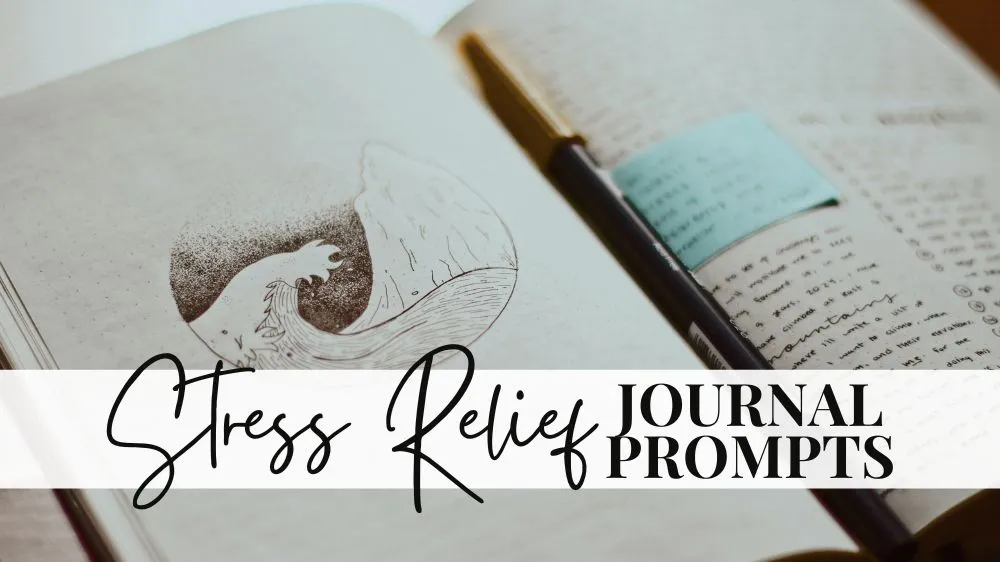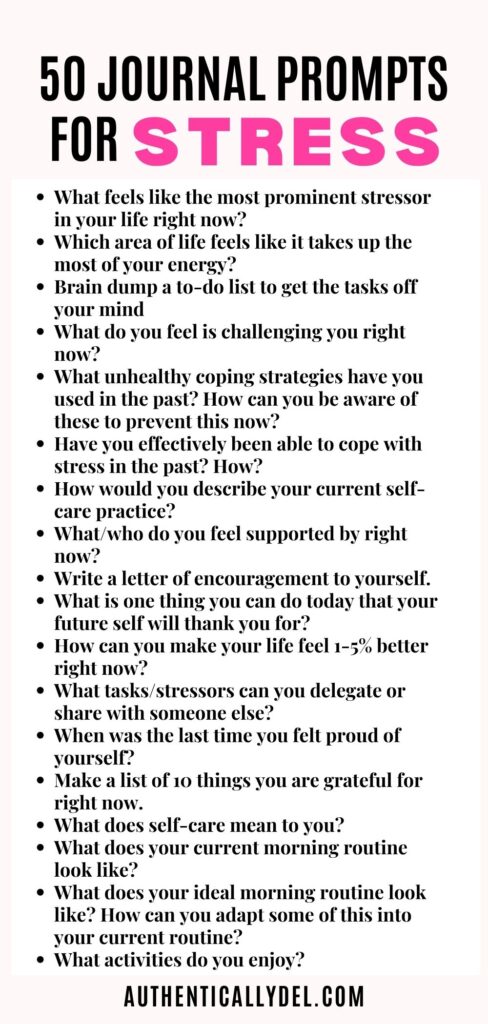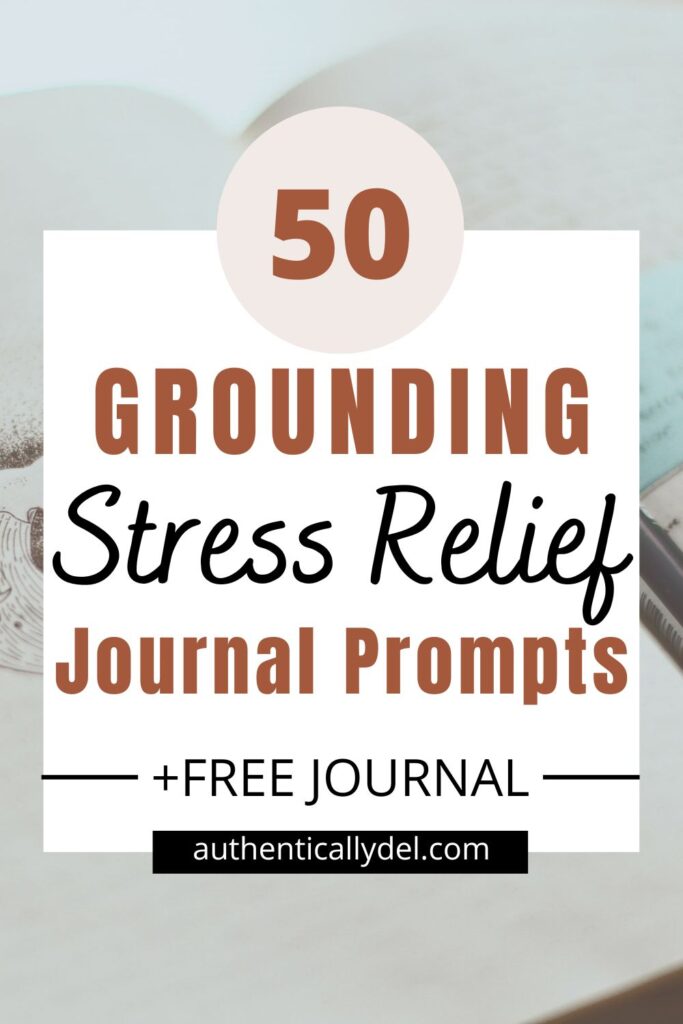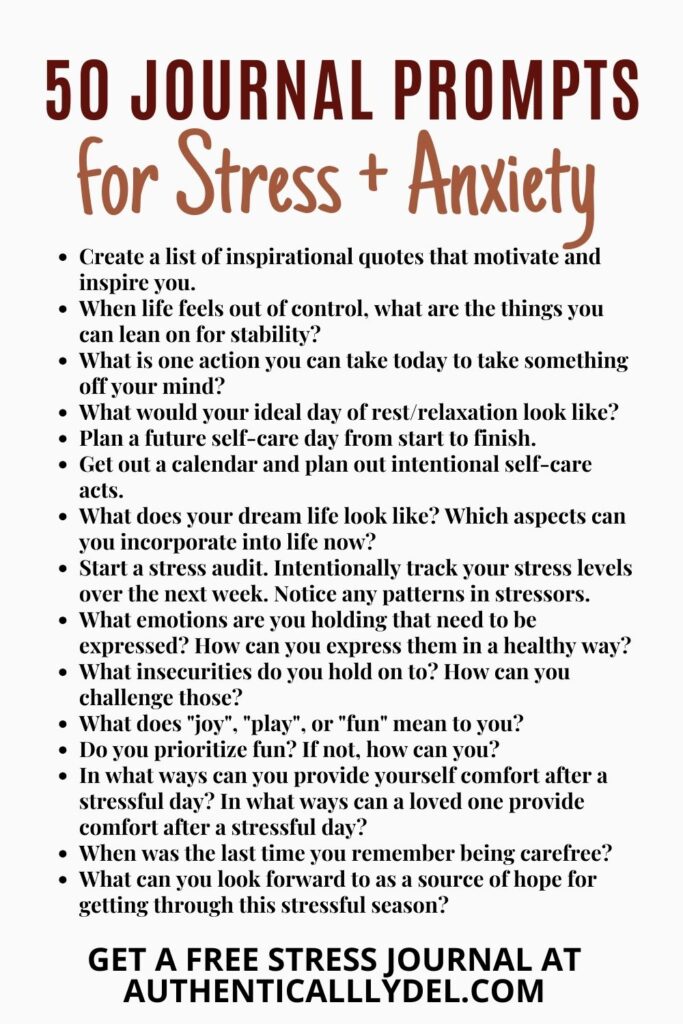This post may contain affiliate links meaning that, I may make commission if you purchase through my links. Learn More.
Journaling is one of the best tools available for managing stress, anxiety, and burnout. Use these 50 journal prompts for stress relief to help you work through those stressors in your life.

In today’s world, some form of stress is inevitable. Whether it be work, finance, relationships, or life-related, we face stressors on a daily basis.
However, how we manage our stress is vital to our overall health and well-being.
Without proper stress management techniques, those seemingly small daily micro-stressors can build to full-blown burnout.
In today’s society, we are facing burnout at levels unlike anything we’ve seen before.
With financial stressors, the emphasis on career success, and the pressure to always seek more, we are spread thin… and our health is paying the price.
If you are feeling the toll of stress, overwhelm, anxiety, and burnout, it may be time to pick up your journal.
Use these 50 journal prompts for stress relief to help guide you to a place of more contentment, better health, and happier life.
50 Journal Prompts for Stress Relief
- What feels like the most prominent stressor in your life right now?
- Which area of life feels like it takes up the most of your energy? (Click here to learn about the 7 Areas of Life)
- Brain dump a to-do list to get the tasks off your mind
- What do you feel is challenging you right now?
- What unhealthy coping strategies have you used in the past? How can you be aware of these to prevent this now?
- Have you effectively been able to cope with stress in the past? How?
- How would you describe your current self-care practice?
- What/who do you feel supported by right now?
- Write a letter of encouragement to yourself.
- What is one thing you can do today that your future self will thank you for?
- How can you make your life feel 1-5% better right now? (Start small! We don’t have to do it all at once.)
- What tasks/stressors can you delegate or share with someone else?
- When was the last time you felt proud of yourself? Describe it.
- Make a list of 10 things you are grateful for right now.
- What does self-care mean to you?
- Which areas of your life need more attention?
- What does your current morning routine look like?
- What does your ideal morning routine look like? How can you adapt some of this into your current routine?
- What activities do you enjoy?
- Where do you feel most at peace?
- Make a list of self-care activities you enjoy. Brainstorm as many as you can!
- Think of past challenges you’ve overcome. What have you learned from them?
- What lessons can you take from this phase of life?
- How would you describe your current work/life balance?
- How can you improve your work/life balance?
- What boundaries need to be set to achieve proper work/life balance?
- Write about every place you can physically feel tension in your body right now. Relax these spaces one by one.
- If you work outside the home, what about your job is most stressful? What is enjoyable/rewarding?
- If you are a stay-at-home parent, what about your role is most stressful? What is most enjoyable/rewarding?
- Make a list of the positive things that have happened to you in the past week.
- What is a healthy form of expression for you (music, poetry, art, etc.)? How can you incorporate more of this into your everyday life?
- Brain dump everything that is worrying or stressing you right now.
- What fears do you feel are adding to your stress right now? How can you challenge them?
- When life feels out of control, what are the things you can lean on for stability?
- What is one action you can take today to take something off your mind?
- What would your ideal day of rest/relaxation look like?
- Plan a future self-care day from start to finish.
- Get out a calendar and plan out intentional self-care acts.
- What does your dream life look like? Which aspects can you incorporate into life now?
- Start a stress audit. Intentionally track your stress levels over the next week. Notice any patterns in stressors.
- What emotions are you holding that need to be expressed? How can you express them in a healthy way?
- What insecurities do you hold on to? How can you challenge those?
- What does your ideal wind-down night routine look like?
- How can you shift your current nighttime destress routine to be more relaxing?
- What does “joy”, “play”, or “fun” mean to you?
- How often do you make time for true fun? How can you incorporate more?
- In what ways can you provide yourself comfort after a stressful day? In what ways can a loved one provide comfort after a stressful day?
- When was the last time you remember being carefree? Describe it in detail.
- What can you look forward to as a source of hope for getting through this stressful season?
How to Start Journaling for Stress?
Here are some tips for starting a stress relief journal:
Decide What Type of Journal
Journaling for stress relief can take multiple different forms. There are lots of wonderful options for different types of journals and journaling styles.
For example, you may want to explore:
Build a Habit
Building a habit to make journaling for stress relief part of your daily routine is key.
Let’s be real.
Our lives are busy. Stress can take over so much of our time and space. Without setting a conscious intention to journal, it’s very likely you will not keep up a stress relief journal practice.
Set aside 10-20 minutes in your everyday routine to focus on journaling. Whether it be a part of your morning routine, night routine, or mid-day pick-me-up, pick a time and make it stick.
Set No Rules
While structure and guidelines are helpful for remembering to journal at all, applying this control or structure to your actual journaling practice can backfire.
When journaling for stress relief, set no rules or rigidity.
Sometimes your journal entries will be beautifully thought-out and organized. Sometimes they will be a messy brain dump. Both are a-okay!
After all, you are journaling to relieve stress, not evoke more of it. Leave the rules for the other areas of your life.
Set No Expectations
Similarly to setting no rules, set no expectations for yourself or your stress journal entries.
If you go in expecting perfection, you are defeating the purpose of the stress relief journal.
Don’t place unnecessary pressure on yourself to “perform”. This journal is a safe place for you to show up in any way. Be authentic, messy, confused, etc.
Your stress journal doesn’t need to be “perfect” – allow yourself to challenge that perfectionism here.
Keep It Simple & Practical
If you are serious about starting a stress relief journal, you need to set yourself up for success. Make this journaling practice simple and practical for you and your everyday life.
For example, you don’t need some expensive or elaborate journal to get started. Heck, even a spare piece of notebook paper and a pen will get the job done.
Or maybe you know you will do better if you have a guided journal you love to motivate you. That’s awesome – go for it!
Or, if you know that handwriting isn’t going to work for you, consider journaling in the notes on your phone or computer. That’s great too!
The bottom line is this: You need to make your journaling practice something that YOU will be able to fit into your daily life realistically.
Whether that be shopping for the best stress journal out there or taking notes on your phone… do what works for YOU.
Consider Sharing
Expressing yourself in a stress journal is such an amazing tool for stress relief. Journaling alone can drastically improve your stress levels and mental health.
However, if you want to take this one step further, consider sharing your thoughts with someone else.
Whether it be a friend, family member, loved one, or therapist, vocalizing and communicating your stressors to someone else can help you work through them, heal, and recover.
As always, I am a huge advocate for therapy. I go weekly and have seen such a drastic improvement in my mental health and stress levels.
SAVE $$ ON YOUR FIRST MONTH OF TALKSPACE ONLINE THERAPY HERE
How Do You Journal After a Stressful Day?
Simply put, you just do your best. Set no expectations or rules. Put no intense pressure on yourself.
After a stressful day, journaling can sometimes be the last thing you want to do.
Here are some quick tips and ideas for how to journal after a stressful day.
- Brain Dump: If structure and guidelines feel like too much pressure, open up a page and just brain dump. Allow it to be messy, chaotic, sloppy, or incomplete. Get out anything you need to!
- Gratitude Journal: When life stressors become too much to handle, turning our attention to gratitude helps. Make a list of 10 things you are grateful for in your life. Short, sweet, simple, and effective for combating stress and overwhelm.
- Create Art: Journaling doesn’t always have to be neatly written words on a page. Consider creating art that is symbolic of your internal emotions/energy. You are free to express yourself in any form!
- Set a Timer: If journaling feels like just another task on your to-do list, set a timer for just 5 minutes. Sit down and write for that time. At the end of the 5 minutes, you can decide if you still want to be done or if you’d like to continue. Either is okay! Just get the ball rolling with 5 minutes.
- Try Different Forms: One of the best things about journaling is how many ways you can do it. It doesn’t have to look how most of us think of journaling. Consider creating art, using voice-to-text, recording audio, doodling, list-making, etc. There are countless ways to utilize journaling – no matter what your needs are that day!
How Does Journaling Help with Stress Relief?
Journaling has many benefits that help aid in stress relief and stress management. These include:
- emotional clarity
- mental clarity
- self-expression
- improved cognitive function
- lowered cortisol levels (your stress hormone!)
- problem-solving skills
- increased creativity
- improved communication skills
- strengthened memory
- burnout prevention
- anxiety relief
Journaling is an emotional release that allows you to express your thoughts, clear your mind, think through problems, draw conclusions and solutions, and feel a sense of clarity in your life.
Free Printable Stress Relief Journal
More Posts for Stress Relief
100 Calming Affirmations for Anxiety





Leave a Reply